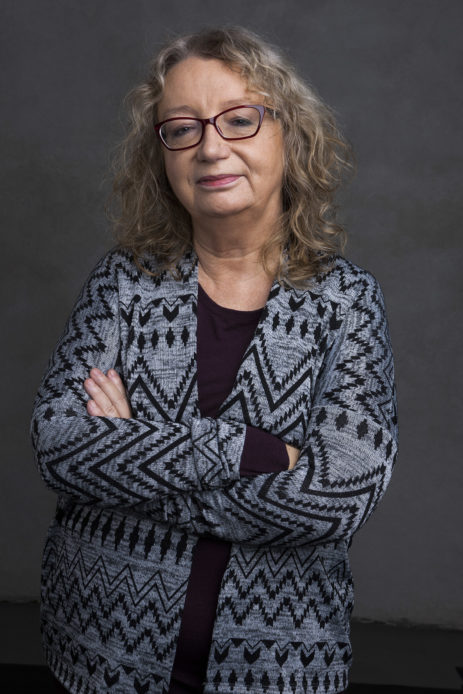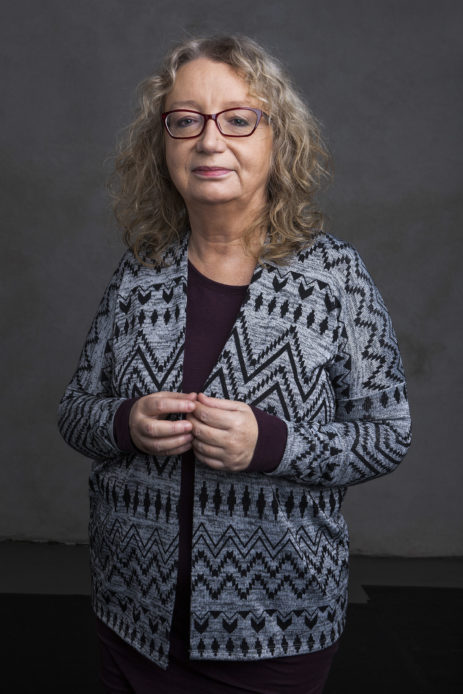MEMBERS

fot. Rafał Placek/ GILDIA REŻYSERÓW POLSKICH
Leading Polish documentary filmmaker and incisive witness of our reality, she produced documentary biopics about Krzysztof Kieślowski, Jerzy Grotowski, Leszek Kołakowski, and many others. Awarded the Knight’s Cross of the Order of Polonia Restituta in recognition of her accomplishments in studying, documenting, and immortalizing the events of March ’68. Member of the Board of Directors of the Directors’ Guild of Poland.
Maria Zmarz-Koczanowicz
“Her films are like a walk through the Poland of the last quarter century in the company of a bright, witty, and curious observer” – wrote the great film critic Tadeusz Sobolewski about Maria Zmarz-Koczanowicz’s documentaries
Primarily the director and writer of documentary films and theatre productions, she has also made one feature film, “The End of the World” (1993). Initially, she wanted to be a painter – she graduated in painting from the Fine Art Academy in Wrocław. She also studied set design, but above all – directing at the Department of Radio and Television of the Silesian University in Katowice. For eight years, she was the deputy dean of the Department of Directing at the Lodz Film School, where she remains a lecturer to this day. Several dozen short student films were made under her guidance.
Her first documentary, “Każdy wie, kto za kim stoi” (1983) showed a situation typical of the martial law period, and of communist Poland in general: standing in a queue. The film’s protagonists participate in this annoying ritual, trying to forcibly, absurdly impose some sort of order, mechanically using the same phrases over and over again – a fact which is emphasized by the director through the repetition of fragmented sentences such as “mister, people have been queuing here since August”. Zmarz-Koczanowicz shows this phenomenon with a touch of irony, but without a sense of superiority. She lays bare this ordinary, everyday event in the life of adult Poles, but above all she exposes the system that oppressively imposes soullessness and egoism, turning life into a series of scripted interactions.
The pattern is repeated in all of the director’s other films from the 1980s: “Jestem mężczyzną” (1985) about a member of the Polish United Worker’s Party who grabs all available positions for himself, including the leadership of the Women’s League, “Urząd” (1986) about bailiffs who collect people’s debts unceremoniously, completely oblivious the dehumanizing effect their work has on them, or “Co wyszło z ziemi?” (1988) about the small town of Środa Śląska whose citizens, obsessed with the idea of finding a hidden treasure, turn into amateur archeologists.
She is the mistress of unconventional and contrary biographical documentaries. She has portrayed, among others, the writer Irena Krzywicka, the great philosopher Leszek Kołakowski, and recently – Adam Michnik
“Her films are like a walk through Poland of the last quarter century in the company of a bright, witty, and curious observer” – wrote the great critic Tadeusz Sobolewski about Maria Zmarz–Koczanowicz’s documentaries. She is impressively sensitive to social change: no matter whether it’s the budding erotic market of the early 1990s (“Kilka uwag o rozkoszy”, 1991), the disco polo phenomenon (“Hanky Panky”, 1996), the club scene (“Miłość do płyty winylowej”, 2002), or the unusual practices of Młodzież Wszechpolska (“I Love Poland”, 2007).
Zmarz-Koczanowicz was also fascinated by the intriguing lives of people from the intersections of cultures – Hatif Janabi, the Israeli Arabic Studies lecturer at the Warsaw University (“Hatif”, 1995), the founder of the Polish Roma Association Roman Kwiatkowski (“Ostatni Cygan w Oświęcimiu”, 1994), or Wiera Gran, who was a Jewish singer before the war, later performed in the Warsaw ghetto, was accused of collaborating with the Gestapo, and finally exonerated by, among others, the Citizen’s Court of the Central Committee of Polish Jews (“Wiera Gran”, 2012).
Zmarz-Koczanowicz has also become a mistress of unusual, contrary, fascinating biographical documents – she has portrayed, among others, the writer and columnist Irena Krzywicka (“Irena Krzywicka – jaka była i nie była”, 1993), the journalist and reporter Teresa Torańska (“Teresa Torańska. My-Oni-Ja”, 1994), the author of “Lost in Translation” Eva Hoffman (“Jedno życie. Eva Hoffman”, 1995), the editor in chief of “Tygodnik Powszechny” Jerzy Turowicz (“Zwyczajna dobroć”, 1998), the founder of Laboratory Theatre Jerzy Gotowski (“Jerzy Grotowski: próba portetu”, 1999), the writer and essayist Jacek Woźniakowski (“Plastyka Polska XX wieku według Jacka Woźniakowskiego”, 2003), the great philosopher Jerzy Kołakowski (“Profesor. O Leszku Kołakowskim”, 2005), as well as Krzysztof Kieślowski (“Still Alive”, 2005) and, recently, Adam Michnik (“Michnik. Bądź realistą, chciej niemożliwego”, 2015).

fot. Rafał Placek/ GILDIA REŻYSERÓW POLSKICH
Maria Zmarz-Koczanowicz is fascinated by great personalities, but also by vivid places (“Moja Warszawa” from 2003, or “Była wojna” from 2013 about the Subcarpathian town of Rymanów inhabited before the war by Poles, Jews, and Ruthenians), and particularly by unconventional communities. In “Nie wierzę politykom” (1990) she showed various groups of “Children of the Martial Law”, from the anarchists to young Pilsudski admirers, and in her famous “Pokolenie 89” – young people from the late 1980s opposition movements, who told stories of their experience of martial law, their work with the “Solidarity” movement, the Round Table, and their later, quite varied, lives (the interviewees include Marcin Meller, Krzysztof Varga, Paweł Piskorski, and Jakub Wygnański).
Recent, continuously reinterpreted, and often discovered anew history is one of the director’s key themes: especially the year 1968 and the trauma of that year’s anti-Jewish witch hunt, which forced thousands of Poles of Jewish heritage to leave the country (“Dworzec Gdański” from 2007, and “Ordinary March” from 2008).
Zmarz-Koczanowicz’s films have received dozens of awards at Polish and international festivals – including the Krakow Film Festival (Bronze Lajkonik for “Jestem mężczyzną”, Golden Lajkonik and Silver Dragon for “Urząd”, Bronze Dragon for “Zamień mnie w długiego węża”, and Bronze Lajkonik for “Pokolenie 89”), the Warsaw Jewish Film Festival (David’s Camera for “Ordinary March”), and festivals in Wiesbaden (“Kocham Polskę”) and Chicago (“Wiera Gran”).
Her only feature film, “Kraj świata”, is equally harsh
on all delusions: both the communist, and the freedom-era ones
Since 1995, she has also made a dozen of productions for TV Theatre – including “E.E.” (1998) based on a novel by Olga Tokarczuk and starring Agata Buzek, Joanna Żółkowska, and Jan Peszek, “Sandra K.” (2000) based on a story by Manuela Gretkowska (starring Magdalena Cielecka, Jacek Rozenek, and Marzena Trybała), and “Pamiętnik z Powstania Warszawskiego” (2004) based on Miron Białoszewski’s work – a play that received four awards at the Two Theatres Festival in Sopot, including for Best Lead Actor (Adam Woronowicz), Best Direction, and Best Adaptation for TV Theatre.
“A friend once gave me Janusz Anderman’s short stories to read on the train. I had never read anything by him. “Kraj świata” dazzled me: I kept thinking how to translate this story onto the screen, scene by scene” – recalls the director when asked about the story behind her only feature film to date (“Kraj świata”, 1993). It features a “chain of hearts”, i.e. a chain of people holding hands, organized by a peculiar man with a thirst for leadership, the statue of Dzierżyński about to be toppled, and even a queue, complete with a waiting list – an echo of the one seen in her directorial debut “Każdy wie, kto za kim stoi” – standing outside a passport office. There’s hardly any plot, just a collection of loosely arranged scenes and images, as well as the mysterious figures of two writers (Jan Nowicki and Olaf Lubaszenko). Everything takes place in the last moments of the People’s Republic of Poland, on the cusp of freedom (as evidenced by multiple “Solidarity” posters). But “Kraj świata” is equally harsh towards delusions of the freedom era, as it is towards communism – showing that all massive social movements can only survive for so long.
Having recently finished Gruba, a documentary about women working in the Rydułtowy coal mine, Maria Zmarz-Koczanowicz is gearing up for her next major documentary biography: this time she’ll tell the story of eminent director Edward Żebrowski.
2015 Michnik. Bądź realistą, chciej niemożliwego (documentary)
2013 Była wojna (documentary)
2013 Nasza szkoła (documentary)
2013 Brave New World (documentary)
2011 Wiera Gran (documentary)
2008 Teorban (teleplay)
2008 An Ordinary March (documentary)
2007 Gdanski Railway Station (documentary)
2007 I Love Poland (documentary)
2007 Moja Kuba, moja Polska (documentary)
2006 I. Znaczy inna (teleplay)
2005 Profesor. O Leszku Kołakowskim (documentary)
2005 Still alive (documentary)
2004 Dziennik.pl (documentary)
2004 Pamiętnik z Powstania Warszawskiego (teleplay)
2003 Dzień przed zachodem (teleplay)
2003 Moja Warszawa (documentary)
2002 Dzieci rewolucji (documentary)
2002 Miłość do płyty winylowej (documentary)
2002 Po deszczu (teleplay)
2002 A Generation 89 (documentary)
2001 Ja, robotnik budowlany (documentary)
2001 Miłość bez wizy (documentary)
2001 Noc z generałem (documentary)
2000 Czarodziejska Góra. Amerykański portret Czesława Miłosza (documentary)
2000 Jasnowidz (documentary)
2000 Sandra K. (teleplay)
1999 Jerzy Grotowski. Próba portretu (documentary)
1999 Prześwit (teleplay)
1998 E.E. (teleplay)
1998 Jej historia (teleplay)
1998 Polska ruletka (documentary)
1998 Życie ci wszystko wybaczy (documentary)
1997 Filantrop (teleplay)
1997 Nasze miasto (teleplay)
1997 Zmień mnie w długiego węża (documentary)
1996 Hanky Panky (documentary)
1995 Hatif (documentary)
1995 Scena miłosna (teleplay)
1994 Ostatni cygan w Oświęcimiu (documentary)
1993 Historia pewnej kamery (documentary)
1993 Jaka była i nie była. Irena Krzywicka (documentary)
1993 The End of the World (TV feature film)
1993 Wesele w Iwoniczu (documentary)
1991 Kilka uwag o rozkoszy (documentary)
1990 Nie wierzę politykom (documentary)
1989 Granica (documentary)
1989 The Major or the Revolution of the Gnomes (documentary)
1985 Jestem mężczyzną (documentary)
1985 Słowo—słowo (documentary)
1984 Plakat (documentary)
1983 Doł (documentary)
2012 Wiera Gran
“Man in Danger” Media Festival – Foundation Monumentum Iudaicum Lodzense Award
Chicago (Polish Film Festival in America) – Special Prize
2009 I Love Poland
Wiesbaden Festival of Central and Eastern European Film “goEast” – Main Prize in Documentary Section
2009 An Ordinary March
Warsaw Jewish Film Festival – “Camera of David” Award for Documentary
Krakow Film Festival — Polish Competition – Chairman of Polish Filmmakers Award
2007 Gdanski Railway Station
“Man in Danger” Media Festival – Foundation Monumentum Iudaicum Lodzense Award
2005 Pamiętnik z Powstania Warszawskiego
“Two Theatres” Festival of Polish Radio Theater and Polish Television Theater) – Award for Adapted Screenplay for Teleplay
“Two Theatres” Festival of Polish Radio Theater and Polish Television Theater) – Award for Directing
2004 Dziennik.pl
Documentary Film Festival “Flow” – Main Prize “Gold Flow”
2003 A Generation 89
Krakow Film Festival – Polish Competition Special Prize “Brass Hobby Horse”
1998 Zamień mnie w długiego węża
Krakow Intenational Short Film Festival – Brass Dragon
1990 Nie wierzę politykom
Head of Cinematography Award for Non-fiction Film — Directing
1989 Sprzedawca chleba
Young Polish Cinema in Gdansk – Best Screenplay
1986 Urząd
Paris Ineternational Film Festival “Cinema du Reel” – First Prize for Short Film
Krakow Film Festival – Grand Prix “Golden Hobby Horse”
Krakow Intenational Short Film Festival – Main Prize “Silver Dragon”
Young Polish Cinema in Gdansk – First Prize for Short Film
Head of Cinematography Award for Documentary
1986 Jestem mężczyzną
Gold Reel –Polish Filmmakers Association Screenwriters Section Award forBest Polish Film
Head of Cinematography Award for Documentary
Krakow Film Festival – Brass Hobby Horse
Young Polish Cinema in Gdansk – Second Prize for Short Film